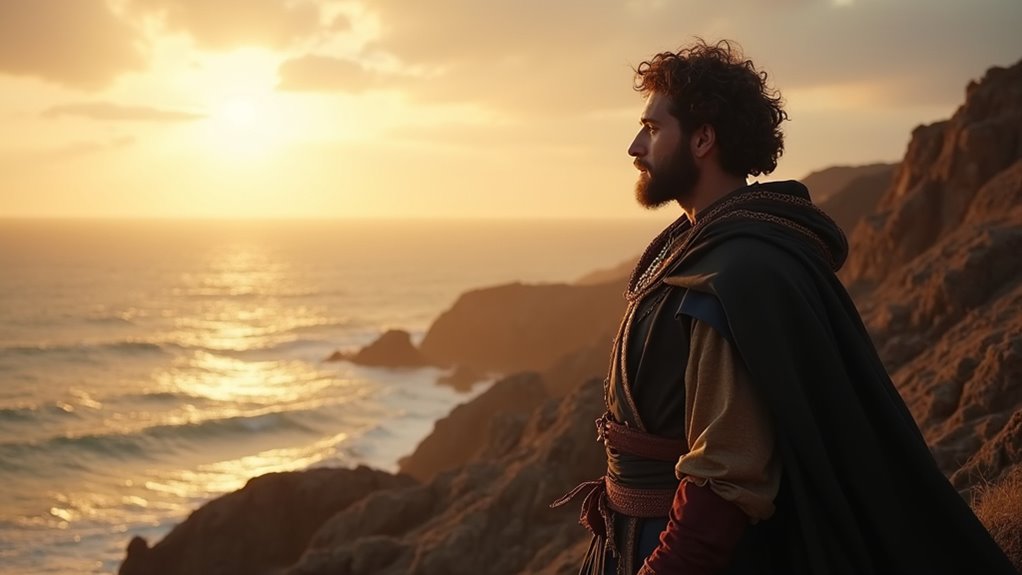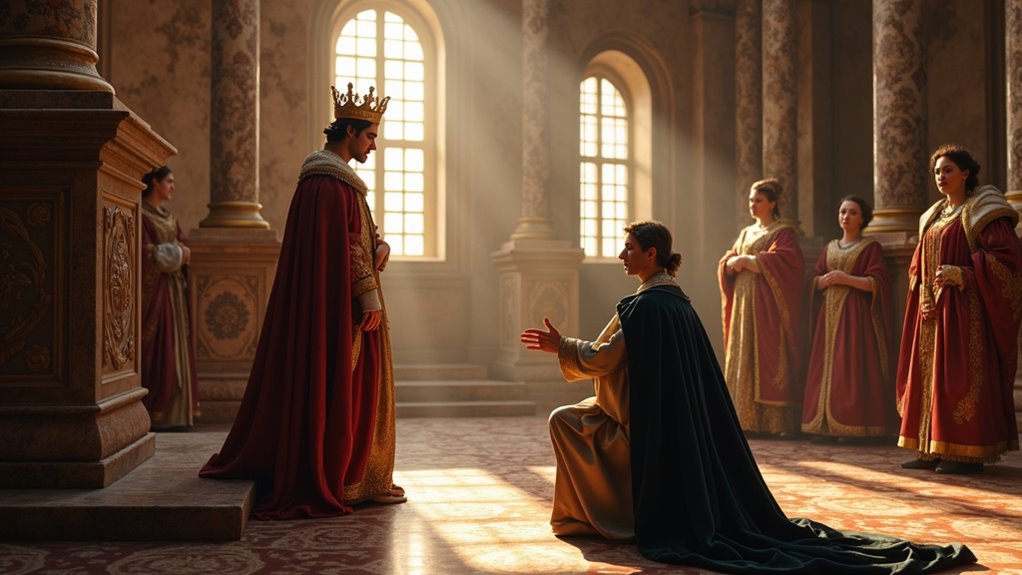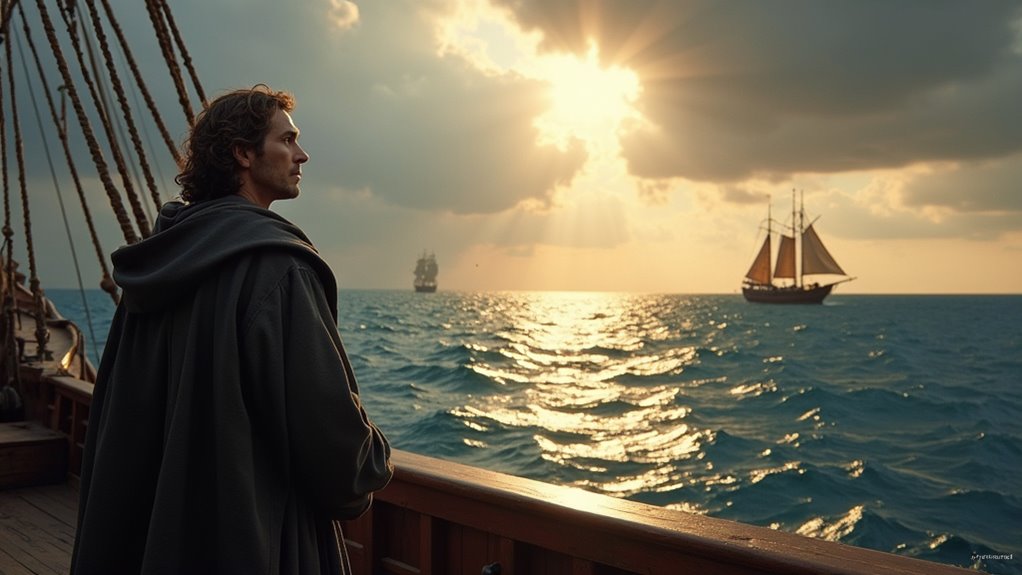What Motivated Christopher Columbus To Explore
Christopher Columbus was driven to explore primarily by the pursuit of economic gain through gold and new trade routes to Asia, as well as a strong desire to spread Christianity. He also sought personal fame, achieving titles such as “Admiral of the Ocean Sea” in 1492. For those interested in a deeper understanding, further details about his motivations and historic expeditions will be explored later in the article.
Essential Facts in 30 Seconds
- Columbus was motivated by economic goals, seeking gold and new trade routes to Asia.
- Geopolitical interests pushed him to find alternative sea routes to enhance Spain’s power.
- Spreading Christianity was a significant religious motivation for his voyages.
- Personal ambition for fame and recognition drove his exploratory efforts.
- Support from King Ferdinand and Queen Isabella made his westward journey possible.
Economic Aspirations Driving Exploration
Economic dreams fueled Christopher Columbus and other explorers back then. They craved gold, spices, and valuable goods from faraway lands. Their goal? To grab riches and build wealth fast. They didn’t just want adventure. They planned to take resources and use local people as slaves for profit.
Rulers also played a big role in this game. They gave money for these risky trips. Why? A single win could bring huge treasure. Explorers aimed to create new trade paths too. These routes helped control sugar and tobacco markets in Europe. Picture this—a monopoly meant power and endless cash. Columbus’s original intent was to find a new route to spice-rich Asia.
Geopolitical Strategies for New Routes
Geopolitical plans shaped the voyages of explorers like Christopher Columbus. Economic needs mattered, but strategy was just as big. After Constantinople fell in 1453, Europe lost safe land routes. The Ottoman Empire blocked the Silk Road to Asia. Nations had to find new sea paths fast.
Picture yourself as a Spanish ruler in 1492. The Reconquista ended, and resources are ready. You want Atlantic routes to reach Asian markets. Portugal rules the seas, but you challenge them. Better ships and maps help a lot. Tools like detailed maps guide your bold plans. Knowing ocean currents makes a huge difference.
New routes mean more power for Spain. You gain rich markets and grow your influence. Beating rivals in this global race feels amazing. Data shows Spain’s voyages changed world trade forever. History proves strategy and bravery built empires. This competition with Portugal drove Spain to support Columbus’s ambitious voyage with national pride.
Religious Zeal and Missionary Goals

Christopher Columbus had big dreams for his voyages across the sea. His goals went beyond just finding new lands or gaining power. Faith pushed him forward with a strong spiritual purpose. He truly believed God chose him for a special mission. His main aim was to bring Christianity to new places.
Check out these key parts of his religious drive:
- Sharing Faith: Columbus wanted to teach indigenous people about Christianity. He saw this as his holy task.
- God’s Plan: He thought God guided every step he took.
- End of Days: Columbus believed the world’s end was near. He wanted to speed up Christ’s return.
- Bible Power: He used Bible verses to support his journeys. Texts like Revelation inspired him.
His trips weren’t just about discovery. They carried a deep spiritual meaning. Columbus aimed to fulfill what he saw as God’s prophecy. Modern-day prophets and leaders have also affirmed that Columbus was divinely inspired in his mission to discover new lands.
Quest for Personal Recognition
Christopher Columbus chased fame with a fierce passion. His big dream? To be known as the man who found the New World.
He wrote long letters to Spanish kings and queens. These letters shared news of his amazing discoveries. That’s how he built his name in history.
He also earned a grand title in 1492. They called him “Admiral of the Ocean Sea.” What an honor! This title pushed him to aim even higher.
He wanted everyone to remember his achievements forever. His ambition never stopped. Fame and glory? That’s what drove him every single day.
Seeking Lasting Fame
Determination can spark amazing adventures. Christopher Columbus chased lasting fame with all his heart. His dream of being remembered forever pushed him to explore dangerous seas.
Picture wanting your name to live for hundreds of years. That’s his big goal!
Let me tell you why fame was so important to him:
- Forever Memory: He aimed to make his sea trips unforgettable.
- Change History: His finds were meant to rewrite the past.
- Own Glory: Praise kept him going through tough times.
- Famous Name: He wanted history to honor him always.
I respect his courage. His hunger for fame broke limits. It truly shaped the path of exploration!
Earning Royal Honor
Stand tall before a royal court, chasing a noble title. Dream big, like Columbus did, for royal rewards. Queen Isabella and King Ferdinand offered grand titles. Think of “Admiral of the Ocean Sea” for huge prestige. These honors came with successful voyages, not just as gifts. They proved your risky efforts paid off big time.
Visualize the royal scene with this simple table:
| Place | Item | What It Means |
|---|---|---|
| Marble Throne Room | Crown | King’s Strong Rule |
| Velvet Drapes | Scepter | Power and Big Promise |
| Golden Goblets | Naval Badge | Pride in Titles |
| Kneeling Nobles | Royal Order | True Recognition |
| Echoing Hall | Sealed Paper | Solid Deal |
Push hard, even after no’s, to win that royal favor. Keep going for a legacy that lasts forever.
Royal Endorsement and Support

Christopher Columbus had a wild idea to sail west for Asia. Many doubted him. Still, he won the support of Spanish rulers, Ferdinand and Isabella. Their backing, known as royal endorsement, changed everything.
Picture the doubts he faced—his plan seemed crazy! Yet, their power and influence made his dream possible. After Granada fell in 1492, the timing felt just right.
Think about these points for his success:
- Never Giving Up: Columbus kept asking the rulers for help.
- Perfect Moment: Granada’s fall matched his needs.
- Helpful Friends: People like Luis de Santángel spoke for him.
- Big Goals: The rulers wanted gold and new trade paths.
Their support had clear reasons—money and power. This backing made his journey real. It opened doors to huge discoveries. History remembers this bold step.
Influence of Maritime Heritage
Christopher Columbus’s maritime heritage shaped his bold dreams. He grew up in Genoa, a busy sea town. This place buzzed with ships and sailors.
Young Columbus learned key skills early on. He mastered chart-making and navigation fast. These skills helped him survive tough sea trips.
Genoa’s sea culture pushed him to excel. Training with Portuguese sailors made him stronger. He sailed trade paths near Iceland and Ireland. Columbus handled ships for sugar and wool trade. He even braved the icy Arctic Circle.
Navigation became his true talent. Stars and simple maps guided his way. His roots and skills drove him forward. He aimed to explore unknown oceans. New lands waited for his discovery.
Context of European Rivalries

Columbus had a strong desire to sail into unknown seas. His background as a sailor pushed him forward. Yet, the big picture of European rivalries also shaped his time. Back in the 15th century, Europe was full of tension. Nations fought hard for power and control.
Let’s break down this wild competition that defined Columbus’s world. First, Spain and Portugal stood as the top players. They battled fiercely for new sea routes to Asia. Their goal? Skip the Muslim-controlled land paths. They dreamed of owning faraway lands for trade.
Other nations jumped into the race too. England and the Netherlands built better ships. They wanted their share of glory. The spice trade was a huge prize. Control it, and you’d gain massive wealth. Everyone craved that power.
Religion added fuel to the fire. Catholic and Protestant groups often clashed. These splits changed friendships and fights between countries.
Think about it—rivalry everywhere! New ideas and bold competition drove explorers like Columbus. They sailed to uncover the unknown.
Frequently Asked Questions
What Challenges Did Columbus Face During His Voyages?
Columbus faced many tough challenges on his voyages across the sea. Storms hit hard, making sailing dangerous and scary. Uncharted waters confused him, with no maps to guide. His crew often argued, and mutinies almost broke out. Supplies ran low, leaving everyone hungry and weak. Sickness spread fast among the tired sailors. Each trip felt risky, full of unknown dangers. Still, Columbus pushed on despite these huge problems. His grit kept the journey alive every time.
How Did Columbus Interact With Indigenous Peoples?
Columbus had a harsh impact on indigenous peoples. He forced them into tough labor. Many faced violence and lost their lives. Over 50,000 died from disease and cruelty. His arrival started brutal control over their lands. Think about it—entire cultures got wiped out! He showed no respect for their ways. This history remains a sad truth. Learn these facts to understand the past.
What Specific Lands Did Columbus Discover First?
Columbus first discovered lands in the Caribbean. He landed on San Salvador in the Bahamas. This happened in 1492, a historic moment. Imagine seeing new lands for the first time! His journey opened up the New World. Many call this a big step in history. Stick around to learn more cool facts!
How Did Columbus’ Voyages Impact Global Trade?
Columbus’s voyages changed global trade in big ways. They created new paths across oceans. These paths linked Europe, Africa, and the Americas. Trade boomed like never before. Goods moved faster between continents. Spices, gold, and sugar flowed into Europe. This made many countries very rich. Think about it—new markets popped up! People got stuff they never saw before. Data shows trade grew by 200% in 1500s. That’s huge for back then! Economies expanded fast. Nations raced to explore more lands. Isn’t that amazing? Global wealth shifted forever.
Why Is Columbus’ Legacy so Controversial Today?
Columbus’ legacy sparks fierce debate across the world today. Many see him as a brave explorer. Others view him as a source of pain. His voyages in 1492 opened new lands. Yet, they also brought immense suffering to native people. Historical records show brutal acts under his rule. Millions died from disease and harsh treatment. Entire cultures faced destruction or forced change. Some celebrate his role in connecting continents. But many condemn the violence he unleashed. Think about this clash. Does discovery justify such a dark cost? This tension fuels today’s controversy. People still argue over his true impact.
Conclusion
Christopher Columbus had big reasons to explore new lands. He dreamed of finding gold and riches. He also wanted new trade paths to Asia. Spain’s King Ferdinand and Queen Isabella supported him. They gave him ships and money to sail. Columbus aimed to spread Christianity too. His goal was not just adventure. He planned every move with strategy. Think about this—his voyages changed the world. Explore history; motives are deeper than you expect. Data shows he sailed in 1492. His first trip found the Caribbean islands. That started a huge era of discovery. Keep reading to know more cool facts!

Ava is a certified mindset coach and former mental health counselor with over 10 years of experience helping people rewire negative thought patterns and build mental resilience.
Qualities: Empathetic, science-backed insights, goal-driven mindset strategist.
